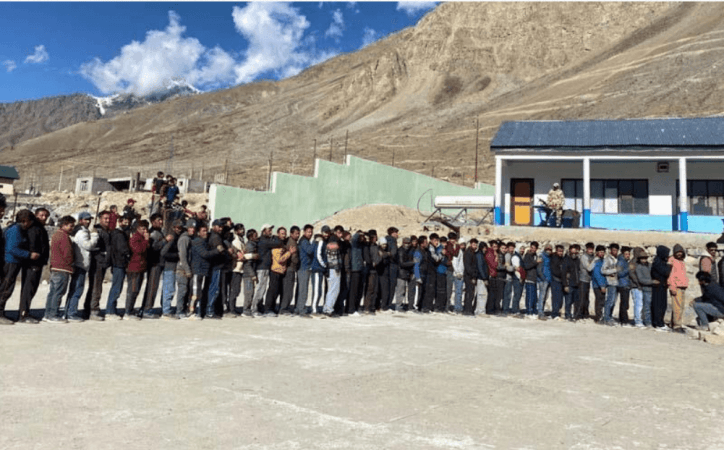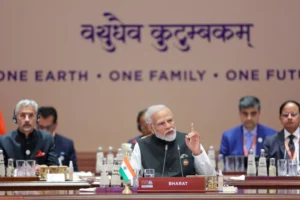In August 2019, the Indian Constitution’s Articles 370 and 35A were repealed, which marked a major turning point in Indian politics overall and in the Jammu and Kashmir area in particular. With the exception of military, money, and foreign affairs, the previous state was given a remarkable degree of autonomy thanks to these constitutional provisions. It was an uncommon instance inside the Indian Union because it also had its own separate constitution and flag.
Additionally, the deletion of Articles 370 and 35A wasn’t only a show of support. It had useful ramifications that dramatically changed the local political climate. The Indian government sought to fully incorporate the region into the Indian Union and bring it under its direct rule by removing these provisions. This action was seen as a brazen assertion of control over a territory that has long been the source of discontent and controversy between China, Pakistan, and even India. The possibility of a demographic shift in the area became one of the main worries after Article 370 was repealed. The native Kashmiri populace, who feared what they called the “Israeli model,” saw this as a serious problem. In order to change the population balance in the ruling power’s favor and secure a stronger foothold in the contested region, this concept entails the formation of settler colonies by the government.
In keeping with this, India passed a number of land rules that appeared to be intended to prevent what some have referred to as the “demographic flooding” of the area. The goal seemed to be to attract non- Kashmiri Indian inhabitants to the area, possibly changing the region’s demographics. This was viewed as a direct threat to the political and cultural rights of the indigenous community as well as the more general question of the right to self-determination.
While the Kashmir Valley has received most of the attention, the ramifications of the repeal of Article 370 have also affected the Ladakh region, particularly the Kargil district. Kargil is culturally unique from other areas of the region because of its distinctive demographic makeup, which includes a sizable Muslim majority and a sizable Tibetan Buddhist minority. The political environment is complex as a result of this diversity.
There was a great deal of unhappiness in Kargil after Article 370 was repealed. The removal of Jammu and Kashmir’s special status and consequent separation from the Union Territory of Ladakh was opposed by many locals. This unhappiness wasn’t specific to Kargil; rather, it was a mirror of broader worries felt throughout the region. Ladakh was separated from Jammu and Kashmir to become a separate Union Territory in August 2019. Due to this substantial administrative reform, Ladakh now has its own independent government and administration. The first elections were then held in Kargil, giving the locals a chance to express their thoughts and political choices.
Multiple political parties ran in the elections for the Ladakh Autonomous Hill Development Council (LAHDC), Kargil. With 12 seats, the National Conference (NC) won, followed by the Congress with 10 members. Only two seats were won by the Bharatiya Janata Party (BJP), while two independent candidates also prevailed. The strong turnout of 77.61 percent was one of the elections for the LAHDC in Kargil that were held on October 4, 2023. The significance of these elections in the area was demonstrated by the high level of participation, which showed that a significant majority of the populace participated in the electoral process. The landslide victory of the National Conference and Congress alliance in the LAHDC, Kargil, elections was a clear rebuke to the policies of the BJP in the region. The BJP’s defeat in these elections, despite significant investment in development projects in the Union Territory, sent a strong message to the ruling party. This election was the people’s way of expressing their rejection of divisive politics and Hindutva extremist ideology and their demand for the restoration of their special rights and autonomy.
The results of the LAHDC, Kargil, elections will have a big impact on the political climate in Ladakh and, indirectly, the rest of Jammu and Kashmir. It proves that the residents of Ladakh are unhappy with the decisions and actions taken by the BJP-led national government. Residents of Kargil have voiced their displeasure with the party’s style of governing despite significant development work in the Union Territory.
The election outcome also emphasizes the need to restore the region’s unique rights and autonomy, which were diminished when Article 370 was repealed. It is clear that there is a great desire among the populace to preserve its cultural and political identity based on the high voter participation and the electoral success of parties who fought for these rights. The region has been significantly affected by the 2019 repeal of Articles 370 and 35A and the consequent division of Jammu and Kashmir into two Union Territories. While the Kashmir Valley has received most of the political attention, Kargil, with its distinctive demographic and cultural variety, has also played a significant part in determining the course of the current narrative.
The 2023 elections for the LAHDC, Kargil, have delivered a loud and unambiguous message to the federal government. The resounding support and success of groups calling for the restoration of special rights and autonomy reflect the hopes and worries of the populace. It serves as a reminder that the people of Ladakh are actively involved in determining their political future and not simply mere bystanders. The election results highlight the need for a more inclusive and nuanced method of governing in the Union Territory and provide decision- makers a chance to respond to the issues of the region’s diverse population. A major chapter in the unfolding tale of Jammu and Kashmir’s future is the political realignment in Kargil.
The author frequently contributes to issues concerning national and regional security, focusing on matters having a critical impact on these milieus. She can be reached at omayaimen333@ gmail.com.
Courtesy by OMAY AIMEN – The Nation
Omay Aimen is a researcher, with an interest in national security, international politics, hybrid warfare & geopolitics. She can be reached at manahil.jaffer786@gmail.com




